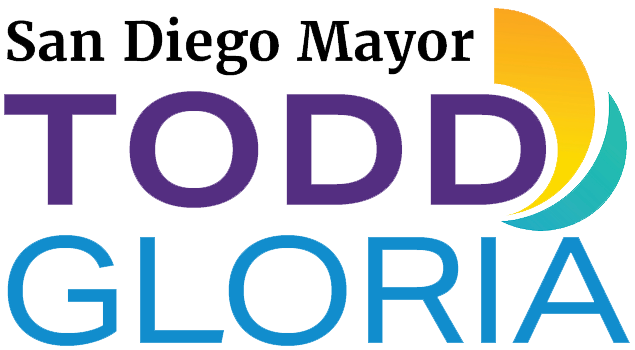Mayor Gloria Unveils Second Housing Action Package to Produce More Homes San Diegans Can Afford
STUDENT HOUSING, HOMES ON UNDERUSED COMMERCIAL SITES AMONG MAYORS LATEST PROPOSED HOUSING POLICY REFORMS
FOR IMMEDIATE RELEASE
Wednesday, August 3, 2022
CONTACT: MayorPress@sandiego.gov
SAN DIEGO Continuing his efforts to build more homes that San Diegans can actually afford, Mayor Todd Gloria today unveiled the second Housing Action Package under his Homes for All of Us initiative, which seeks to address the housing crisis by making it easier to build new homes for people of all income levels in all corners of the city.
We must build more housing, and my administration is continuing to develop policy reforms that will put more roofs over San Diegans heads at prices they can afford. Earlier this year, the City Council passed my first Housing Action Package, but were not stopping there, Mayor Todd Gloria said. Im confident that once this new batch of creative ideas is implemented and added to what weve already done, it will help us address San Diegos longstanding housing-affordability crisis and prevent more homelessness.
Mayor Glorias first Housing Action Package was passed by the City Council in February.
Housing Action Package 2.0 will implement SB10, the state law that allows the construction of more new homes near transit; create anti-displacement measures to protect current residents; increase the supply of land available for the development of new homes; and incentivize and promote new housing opportunities in all communities that San Diegans of all income levels can afford.
The City of San Diego must put all ideas on the table to overcome obstacles to building housing for all, said City Councilmember Joe LaCava, vice chair of the City Councils Land Use and Housing Committee. Continuing the momentum of Homes for All of Us, Mayor Gloria is creating more tools to get housing built. Ahead of us is a months-long public process from workshops to City Council to ensure that residents have a voice in shaping the dialog.
San Diegans are in dire need of affordable homes. These are our family, friends and neighbors, said the Citys planning director, Heidi Vonblum. We must create policies and regulations that allow the construction of homes that are affordable at all income levels and that meet the needs of all San Diego families. We look forward to engaging with the public to help shape these policies to best accomplish this.
Here are the details:
Senate Bill 10 implementation: SB 10, passed by the state legislature in 2021, allows cities to approve projects that build up to 10 homes per multifamily-zoned parcel in transit-rich areas through a streamlined process, with a potential option for additional homes on single-family zoned parcels in transit-rich areas. The additional homes would be allowed subject to certain regulations, including the provision of onsite affordable homes.
Affordable housing anti-displacement protection: This action would strengthen the Citys regulations to protect tenants in existing affordable homes who could be displaced by the construction of new homes by lengthening noticing requirements, providing relocation assistance and prioritizing existing residents, which will be informed through the public-engagement process.
Complete Communities Housing Solutions refinements: The Complete Communities Housing Solutions package of incentives was approved in 2020. This action would include certain refinements aimed at incentivizing the production of new homes for families of all sizes, including potential new incentives for homes with three or more bedrooms and moderate-income homes.
Homes on underused commercial sites: Vacant or underused retail, office and shopping center sites may be appropriate locations for new homes. This action would include new development incentives for new affordable homes on these sites.
Incentives to discontinue harmful uses near sensitive residential uses: This action is intended to phase out harmful industrial land uses where housing is allowed in order to increase the availability of land available for affordable housing and advance environmental justice in neighborhoods that have been disproportionately affected by pollution.
Offsite density bonus and inclusionary-housing requirements: Under the City of San Diegos inclusionary-housing ordinance, housing developers are required to build a certain number of affordable homes or pay into a fund used to create affordable housing. Currently, they may build those affordable homes offsite within the same community planning area. This action aims to create more affordable housing in communities that currently lack it by redirecting construction of these homes, whether created through the fund or the offsite option, to high resource areas areas close to good-paying jobs that have low levels of air and water pollution and a high educational achievement.
Single-room occupancy (SRO) home incentives: SRO homes are a housing type for residents with very low incomes and residents at risk of homelessness. This action would include development incentives to construct new SRO homes.
Student housing: San Diegos lack of student housing puts pressure on the housing market for the non-student population. This action would allow for private, dormitory-style efficiency homes in multifamily locations near universities and close to transit.
Accessory Dwelling Unit (ADU) Home Density Bonus and Accessible ADU Programs: ADU Home Density Bonus Program regulations are intended to allow for development of ADU homes throughout the City in a streamlined, cost-efficient manner. This action would develop ways to incentivize the production of low- and very-low-income ADU homes while maintaining or improving the current level of production under the program, as well as identify incentives for property owners to construct ADA-accessible ADU homes, based on further economic analysis.
Workshops to obtain public input on these Housing Action Package actions will begin in September. Detailed regulations will be presented to the Planning Commission and the City Councils Land Use and Housing Committee in spring 2023.
###


